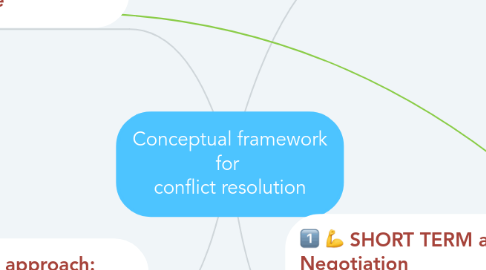
1. MIDDLE TERM approach: Mediation
1.1. ABC rules
1.1.1. Activating agent
1.1.2. Beliefs
1.1.3. Consequences
1.2. Mediation stage 4
1.2.1. Needs
1.2.2. fears
1.2.3. Concerns
1.3. Leadership Plus
1.3.1. defuse
1.3.2. reframe
1.4. William Ury
1.4.1. The third side
1.4.2. Common stories
2. LONG TERM approach Horizontal authority cf. P. Verhaeghe
2.1. Authority > power
2.1.1. shared values
2.1.2. no power base conflicts
2.2. Authority within group
2.2.1. based on knowledge
2.2.2. based on shared moral goals
2.2.3. based on shared rules
2.3. Autonomy within collectivity
3. Factors at play in conflicts
3.1. Values
3.1.1. Source of Values and Arenas of Practice
3.1.1.1. Self
3.1.1.2. Group
3.1.1.3. Profession
3.1.1.4. Organisation
3.1.1.5. Culture
3.1.2. Valuation process
3.1.2.1. Self
3.1.2.2. Motive
3.1.2.3. Understanding
3.1.2.4. Value
3.1.2.5. Attitude
3.1.2.6. Action
3.2. Cultural considerations cf. E. Buchtel
3.2.1. Non-essentialistic thinking
3.2.1.1. stereotyping
3.2.1.2. sociotyping
3.2.2. Morality and values
3.3. Different power bases cf. French & Raven's ('59)
4. SHORT TERM approach Negotiation cf. Quong & Walker ('11)
4.1. Positional negotation
4.1.1. bargaining
4.1.2. Power bases at play
4.1.2.1. Competing values
4.1.2.2. win-lose
4.2. Interest based negotiation
4.2.1. distributive
4.2.2. collaborative effort
4.2.3. good school approach
